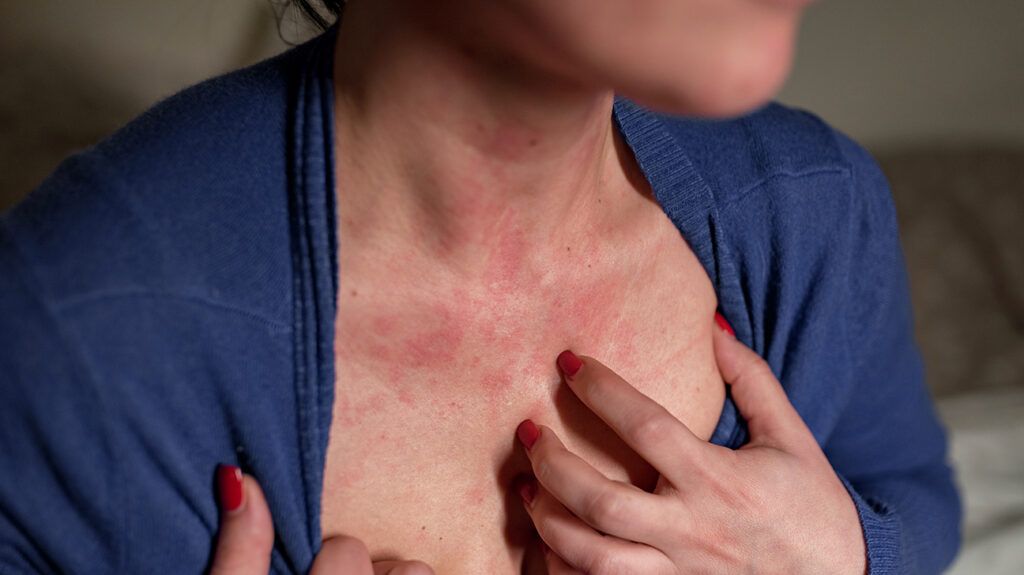Itching and red welts don’t always indicate an allergy. Anxiety stress hives can be brought on by chemicals released during your body’s biological threat response.

Anxiety and stress can be a part of life, and when you experience unwelcome physical side effects, they can add to the discomfort you’re already feeling.
Hives, known medically as urticaria, can have a number of causes, but short-term and long-term management strategies exist.
All of the same biological processes that cause common anxiety symptoms, like rapid breathing and increased heart rate, can also cause you to break out in hives.
Dr. Daniel Boyer, a medical doctor specializing in research, explains the symptoms of hives result from a histamine-releasing response in the body brought on by stress.
“When we are under stress, our bodies release the hormone adrenaline, which increases our heart rate and blood pressure while also reducing blood flow to our skin,” he says. “In addition to adrenaline, the body releases histamine, which causes inflammation and itchiness in our skin.”
While histamine is one of the primary mechanisms behind anxiety stress hives, elevated body temperature and the increased presence of sweat
Approximately 20% of people will experience hives at some time in their life.
Hives associated with stress tend to emerge quickly but also resolve quickly — within 30 minutes to an hour.
Can anxiety and stress cause other skin challenges?
Hives aren’t the only way your skin may react to stress. In 2018, a questionnaire-based
- oily, waxy patches or flakes on the scalp
- dry or sore rash
- warts
- pimples
- itchy skin
- hand rash
- hair loss
- scaly skin
- excessive sweating
- face rashes
Stress may also worsen existing skin conditions, such as:
Can anxiety stress hives be serious?
While stress hives tend to resolve on their own, Boyer cautions there can be cases where stress can lead to more serious skin rashes, like shingles.
“Shingles are caused by the reactivation of the varicella-zoster virus, which also causes chickenpox and herpes simplex,” he indicates. “It often occurs as a complication of long-term stress and can be triggered by physical or emotional trauma,” Boyer explains, such as:
- an accident
- illness
- death of a loved one
Shingles can not only be very painful when present, but it can also lead to Ramsay Hunt syndrome or postherpetic neuralgia (PHN).
Stress-related hives are often self-limiting, meaning you rarely need to seek medical attention. When you notice a flare-up, you can try to alleviate symptoms by:
- avoiding or reducing elevated body temperature
- wearing loose-fitting clothes
- applying a cold compress or ice pack
- applying over-the-counter topical anti-itch ointment
- using an over-the-counter oral antihistamine
If you know stress is a trigger for hives, there are long-term management options that may make a difference.
Moisturizing
Dry skin can add to the irritation factor when stress comes around. Using a fragrance-free and breathable moisturizer several times a day may help.
Keeping your skin cool
Elevated body temperature from stress may encourage hives. Dressing in layers when you know you’ll be in a stressful environment like work or at social events can allow you to add or remove clothing as necessary.
Getting regular exercise
“A consistent, healthy exercise routine can help you manage stress in your life. It can also help you stay healthy overall,” advises Boyer.
Cultivating relaxation techniques
If stress and anxiety are the cause of your skin troubles, managing these conditions could help you manage hives.
As one example, “deep breathing is a simple way to relax your body and mind,” says Boyer. “It can also help you stay grounded and focused when dealing with stressful situations.”
Worth bookmarking
Seeking care
Anxiety and chronic feelings of stress aren’t always related to current situations.
Childhood experiences, trauma, and underlying mental health conditions may make managing stress on your own a challenge.
Speaking with a mental health professional can help you discover ways to cope with anxiety by addressing underlying causes.
It may be beneficial to speak with a dermatologist if stress hives aren’t resolving, are painful, or are getting worse.
It’s natural for stress and anxiety to show up on your skin. Early-stage anxiety stress hives are a side effect of your body’s fight-or-flight response to a threat.
You can help limit the impact of anxiety hives with:
- cold applications
- antihistamines
- long-term stress management
If stress and anxiety feel overwhelming, speaking with a mental health professional may help.
